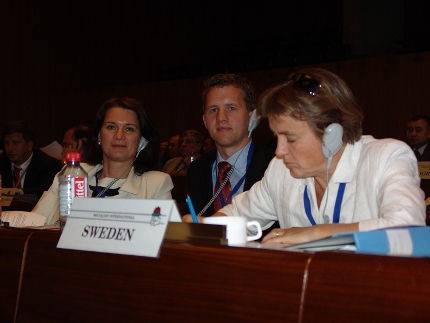Snapshots...
Geneva Council, 29-30 June 2007
Dalibor Riccardi, PSD, San Marino, SI Meeting at the 138th IPU Assembly in Geneva
Search the archives by region
Africa
Asia-Pacific
Europe, the Caucasus and Black Sea
The Americas the Caribbean
Middle East and Arab World
People
Hans Janitschek, Secretary General of the Socialist International (1969-1976) passes away
21 February 2008
 On 21 February 2008, the eventful life of Hans Janitschek came to an end at one of the many places of his activities, the Headquarters of the United Nations in New York. Since his early adolescence, remaining both loyal and critical towards the Austrian social democracy, he found his first sphere of activity in journalism, where he was inspired by such figures as Hugo Portisch.
On 21 February 2008, the eventful life of Hans Janitschek came to an end at one of the many places of his activities, the Headquarters of the United Nations in New York. Since his early adolescence, remaining both loyal and critical towards the Austrian social democracy, he found his first sphere of activity in journalism, where he was inspired by such figures as Hugo Portisch.
The young editor of ‚Sozialistische Korrespondenz‘, who often accompanied the then new chair of the Social Democratic Party of Austria, SPÖ, Bruno Kreisky, on his election campaign trips eventually followed a call to the Socialist International in London. In 1969, at the SI Congress, at a time when the organisation was still much more focused on Europe, he became the new secretary general.
With impetuous energy and full of ideas, he tried from the start to give life to the modest apparatus of an organisation, which was not granted any special role by its member parties. Through his initiatives, he tried, first and foremost, to earn the International the role as a companion of the new, free nations in a Third World which was in transition and to open up the International to parties and liberation movements from Asia, Africa and Latin America. This came true especially in Latin America and the Caribbean where leaders like José Francisco Peña Gómez from the Dominican Republic or Carlos Andres Péres from Venezuela and Lionel Brizola from Brazil joined the work of the International. At the same time, the Socialist International became a visible force at the forefront of the fight against the last remaining dictatorships in the Mediterranean region and Hans Janitschek turned into an ally of those involved in the struggle, such as Mario Soares, Felipe González and Andreas Papandreou.
During these years the International also found a new role in the Middle East where conflicts unresolved for decades triggered ever new crises of world politics. Bruno Kreisky managed to lay open the long concealed roots of this conflict, that of the Palestinian question, by means of his today legendary Socialist International missions to the Middle East during which a new dialogue with the Arab world was taken up. By his side, we find over again Hans Janitschek.
So the significant role of the International, the role it would play in world politics later under the leadership of Willy Brandt together with Bruno Kreisky and Olof Palme, has some roots in this era. Having handed over his tasks at the International to Bernt Carlsson, Janitschek assumed a new area of activity at the United Nations in New York upon the recommendation of Bruno Kreisky. In particular, he took part in the development of the organisation’s new Population Fund and attempted successfully to involve into his work the big political families of the world, parliaments but also parts of civil society.
In this way, he created new connections between the UN, which was until then often restricted to contacts between governments, and political formations more on the grassroots level.

He also established for himself a further field of work in New York, in its political and cultural sphere, and became a mediator between the American life and Austria, a position which he filled also through his work as a correspondent for a big Austrian tabloid. He also employed himself as a writer, especially as the author of biographies of famous representatives of international social democracy.
His continuous bond with Austria and his active interest in its democratic development was expressed by his work for the political representation of Austrians abroad, particularly for their right to vote.
So at the end of his life, there was the multifaceted appearance of an Austrian cosmopolitan, made from a unique mould, who accompanied some of the key political figures of this world on their way and contributed to setting the course for the future of large institutions and organisations. Though some projects stayed unfinished, we do look on a work of awe-inspiring dimensions.
Peter Jankowitsch, former Federal Minister of Foreign Affairs of Austria









